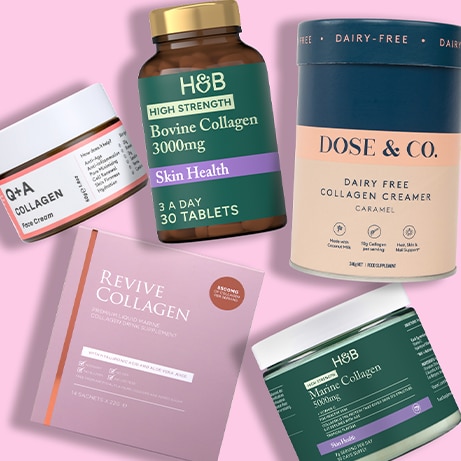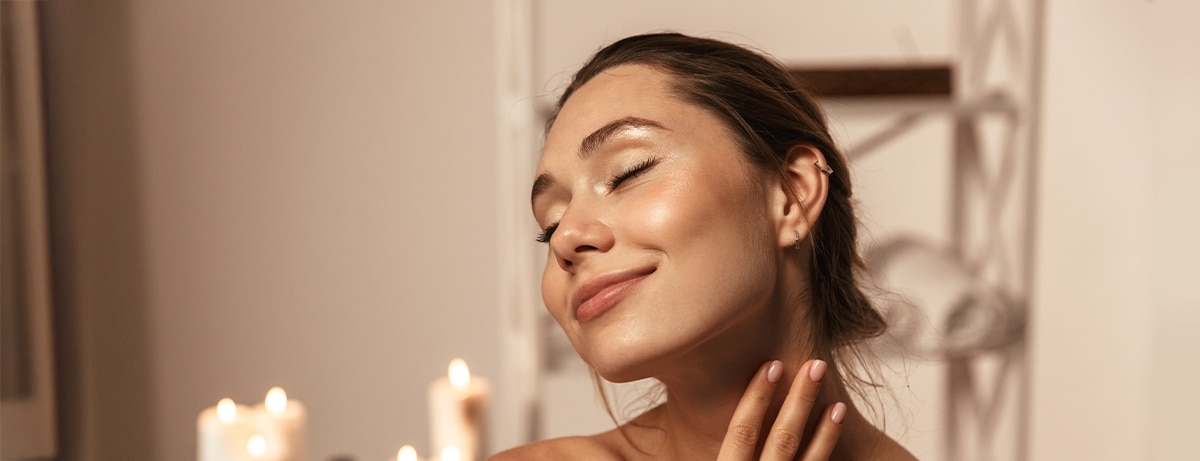15% off £25 or 20% off £35
Code:BASKET
Protein: the secret ingredient for stronger, shinier hair

Think protein only powers your workouts? Its benefits go way beyond the gym. From strength to shine, discover how eating enough can transform your hair - and the best foods to fuel it.
Summary
1Why hair needs protein
Hair is mostly made of protein, so what you eat really matters. If you don’t get enough, strands can become weaker/thinner and more prone to breakage…
2What does protein do for hair?
Protein gives your hair its strength and structure. It supports growth, helps reduce shedding and keeps strands looking healthy and resilient…
3Sources of protein for healthy hair
From chicken and fish to beans, nuts and grains — a balanced mix of protein-rich foods helps nourish your body and support stronger hair…
Has dry, brittle hair got you down? Are you struggling with breakage or finding it impossible to grow your strands past your shoulders? If you’re looking for ways to support your hair, here’s the secret: healthy hair starts from within.1
A balanced diet is key if you want luscious locks – and that means getting enough of all the nutrients you need, including protein.1 Let’s talk about the power of protein in hair care and which protein-rich foods may help you achieve healthier hair.
Why hair needs protein
Proteins in your diet are made up of building blocks called amino acids.2 These amino acids are used to make the proteins your body needs to survive, including those that give the skin and hair their structure.1-3
Hair is mostly made up of a protein called keratin.1,4 Sounds like you should eat more keratin then, right?
Unfortunately, it’s not that simple. Your body can’t absorb most keratin from food because it can’t break it down.4 Instead, your body builds all the keratin it needs from the amino acids found in the protein you eat.4
Keratin production isn’t the only reason your hair needs protein, though...
What does protein do for hair?
As protein is essential for healthy hair growth and strength, a protein deficiency can lead to hair thinning and even hair loss.1 In fact, one form of hair loss, known as telogen effluvium (TE), can happen in people who aren’t eating enough protein, but more on this in a second.5
That’s not all, either – protein is also an important source of essential vitamins like B and E.5 A lack of vitamin B is linked to hair loss. 5,6
One B vitamin, biotin, comes almost entirely from the protein you eat.6 And here’s why that matters: biotin helps your body produce proteins, including keratin, the key hair component we mentioned earlier.7
But before you reach for biotin supplements, most healthy people get enough biotin from their diet.7 And unless you’re deficient, there’s not much evidence that taking biotin supplements will help your hair.6,7
Although it’s not always obvious, your body has subtle ways of letting you know when it’s running low on biotin or protein. Let’s find out how to recognise the signs that could mean you’re not getting enough protein.
Does your hair need more protein? Here’s how to tell
When you have a severe protein deficiency, your hair pays the price – it may become thin, dry and lustreless, and can even lose some of its colour.8
A lack of protein can also lead to TE – a condition where more hair than normal falls out, leading to hair loss.1,5,9 This condition isn’t just down to lack of protein, and can also be caused by other nutrient deficiencies or stress.1,5,9

TE signs to look out for include:9
- hair shedding
- decreased hair thickness
- reduced hair volume
Usually, hair regrows once the underlying cause has been dealt with, but full recovery can take several months.9
Environmental factors can also leave your hair dry, dehydrated or damaged.10,11 Sunlight, frequent washing, brushing and styling (especially with heat) can all weaken the hair surface, making hair more prone to breakage and split ends.10,11
But it’s important to distinguish between hair damage caused by the environment and hair loss and thinning caused by protein deficiency.9-11 For tips on restoring dry or heat-damaged hair, check out our dry hair recipe guide.
If you’re worried that a nutritional deficiency may be the cause of your lacklustre hair or even hair loss, it’s a good idea to get checked out by your GP.12
Sources of protein for healthy hair
Protein is needed to keep your entire body healthy, so it’s important to get enough.1-3 According to the British Nutrition Foundation, UK adults should eat 0.75g of protein per kg of body weight a day.13
What does that look like? For a 75kg man, that’s about 56g of protein a day, while a 60kg woman should aim for around 45g.13 However, keep in mind that older adults or those with active lifestyles may need even more.13
So, what should you be eating to hit your protein goals? Lean meats like chicken breast, beef steak and lamb chop are some of the richest sources, providing 29–32g of protein per 100g.13
But you shouldn’t rely on meat alone – pulses, beans, wholegrains and nuts are also excellent plant-based protein options.13 Including plant-based proteins is good for your overall health but can also benefit your hair due to the variety of vitamins and minerals. Try to include a mix of these in your diet for a balanced approach.
Topical protein treatments and hair masks: help or hype?
Protein-infused masks, conditioners and salon-style treatments (like keratin or bond-building formulas) can smooth frizz, improve the look of split ends and add temporary shine, but they don’t work the same way as protein in your diet.10
You may have seen creators on social media suggest that overusing protein-heavy products can leave hair feeling dry and brittle - a bit like uncooked pasta that snaps when bent. While protein can temporarily strengthen the outer cuticle, it’s thought that too much may disrupt the balance between protein and moisture. At this stage, there isn’t enough robust evidence to confirm or deny this, so the jury is still out.
If you do give them a go, remember balance is key. Combining protein-based products with moisturising care can help keep your hair feeling softer and more manageable. Occasional use may help reduce frizz or improve the look of split ends, but hydration remains essential.
The final say
Protein is fundamental for strong, healthy hair, as it supports keratin production.1,4,6 Lean meats, pulses and nuts are just a few examples of great protein-rich foods that help nourish your whole body – including your hair.1-3,13
For more info on how diet affects hair health, check out which vitamins are good for your hair.
Disclaimer - This article provides informational advice and is not a substitute for medical care. Curated by experts for accuracy, we take great care to ensure the information is up-to-date and relevant. However, you should always consult your GP or healthcare professional before using supplements or alternative products, particularly if you have medical conditions or are under supervision.
1. Lin RL, et al. Systemic causes of hair loss. Ann Med. 2016;48(6):393–402. https://doi.org/10.1080/07853890.2016.1180426
2. Wu G. Dietary protein intake and human health. Food Funct. 2016;7(3):1251–65. https://doi.org/10.1039/C5FO01530H
3. Cibrian D, et al. Metabolic Pathways That Control Skin Homeostasis and Inflammation. Trends in Molecular Medicine. 2020;26(11):975-986. https://doi.org/10.1016/j.molmed.2020.04.004
4. Trüeb RM. “Let food be thy medicine”: Value of nutritional treatment for hair loss. Int J Trichology. 2021;13(6):1–3. https://doi.org/10.4103/ijt.ijt_124_20
5. Natarelli N, et al. Integrative and mechanistic approach to the hair growth cycle and hair loss. J Clin Med. 2023;12(3):893. https://doi.org/10.3390/jcm12030893
6. Almohanna HM, et al. The role of vitamins and minerals in hair loss: A review. Derm Ther (Heidelb). 2018;9(1):51–70. https://doi.org/10.1007/s13555-018-0278-6
7. Patel DP, et al. A review of the use of biotin for hair loss. Skin Appendage Disord. 2017;3(3):166–9. https://doi.org/10.1159/000462981
8. Wong CY, et al. Cutaneous signs of nutritional disorders. Int J Women’s Dermatol. 2021;7(5):647–52. https://doi.org/10.1016/j.ijwd.2021.09.003
9. British Association of Dermatologists. Telogen effluvium [Internet]. [cited 2025 Mar 7]. Available from: https://www.bad.org.uk/pils/telogen-effluvium/
10. Dias MFRG. Hair cosmetics: An overview. Int J Trichology. 2015;7(1):2–15. https://doi.org/10.4103/0974-7753.153450
11. Richena M, Rezende CA. Morphological degradation of human hair cuticle due to simulated sunlight irradiation and washing. J Photochem Photobiol B. 2016;161:430–40. https://doi.org/10.1016/j.jphotobiol.2016.06.002.
12. NHS Choices. Hair loss [Internet]. [cited 2025 Mar 7]. Available from: https://www.nhs.uk/conditions/hair-loss/
13. British Nutrition Foundation. Protein [Internet]. [cited 2025 Mar 7]. Available from: https://www.nutrition.org.uk/nutritional-information/protein/



.png)








